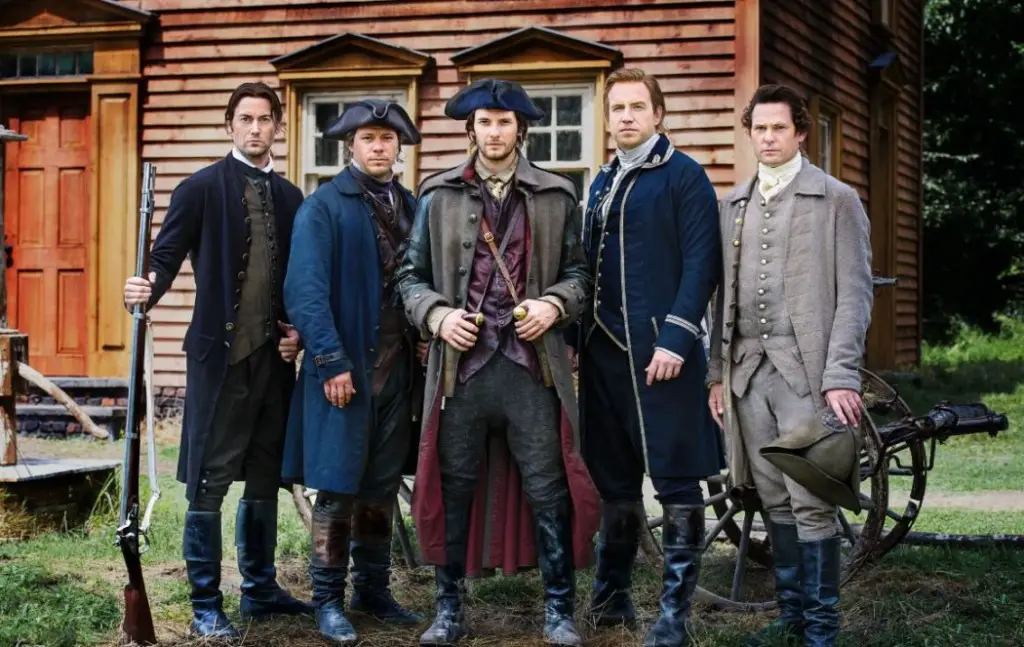Well, we have something else for the Saturday Matinee (another Amazon pilot, actually, hat tip to Tam and Roberta), and we finished watching this (six hours, counting five hours of Sam Adams and Geico ads) so we’re going to unload this one this morning. Call it a Wednesday Matinee.
What Sons of Liberty is, is a sort of re-imagining of the Revolution from around 1765 to 1776, an an action flick, with Sam Adams and Paul Revere as the key action heroes. The story does hit some of the high points, including the Boston Massacre and the Battles of Lexington, Concord and Bunker Hill; but it omits others, including John Adams’s defense of the Massacre officers and the Colonial seizure of Fort Ticonderoga (and the transport of the guns to the hills overlooking Boston, which forced the British withdrawal). It fictionalizes the historic events, almost beyond recognition in some case, and it includes events that never happened, like a powder raid we’ll mention below, a sexual affair we doubt any historian ever would stand up to claim was real or even likely, and whole battles conjured from the fertile minds of scriptwriters.
As an action film set in the American Revolution, it’s pretty entertaining. Who knew that Sam Adams could swing from balconies, John Hancock blast Redcoats with a pistol, or Paul Revere throw a knife?
The series drops the ball completely on explaining why the American colonies and the Crown drifted ever closer to war in the 1760s and 70s. Apparently fearing that History Channel audiences, brains sapped by a steady diet of space alien and superstitious-inbreed reality-show Scheißdreck, couldn’t follow the conventional explanation of the Stamp Act and Coercive Acts (known in America as the Intolerable Acts), they instead explain the Revolution by making the British leaders craven brutes. (Seriously, the portrayals of General Gage and Major Pitcairn here make The Patriot’s hatchet job on a thinly-disguised Banastre Tarleton look like a careful and respectful treatment of a sympathetic and three-dimensional character).
We are spared another complete temporo-spatial transplantation of a massacre, like The Patriot’s “pre-enactment” of the 2nd SS’s butchery at Ouradour-sur-Glane. So there is that. And again, taken purely as an actioner, the miniseries is pretty good.
Acting and Production
Once you’ve accepted that this is not the history of the American Revolution, but rather Hollywood Generic Action Film Plot 3B framed by some events of the Revolution, you can appreciate what the actors are doing. They’re all pretty good, but Martin Csokas is a standout as a version of General Thomas Gage written and played with the resonant evil of a Bond villain. The guys playing the Sons are mostly young, skilled TV actors (mostly younger than the actual men they’re portraying were, but then, the actual men they’re portraying didn’t need Jackie Chan athletics to found a nation).
The action is constantly moving and usually attractive to the eye. The green-screen, CGI and stunts all advance the story, and are mostly cinema-quality (some of the scenes of ships are not, so much).
It is the script that is the unavoidable irritant here. The constant use of juvenile anachronisms is irritating and makes one wonder if the whole thing was drafted by someone using the free Wi-Fi in a hookah bar in Boulder. No, a senior statesman would not have described one of his allies’ ideas as “batshit crazy.”
It doesn’t go quite so far as Revere telling Dawes, “Yo, dawg, let’s roll!” but it gets close. One character actually uses the metaphor “A Bridge Too Far” for a position beyond which the Continental Congress could readily be persuaded. This metaphor came into the language from the title of a book published approximately two centuries later. We have a first edition. Bought new.
The anachronisms extend beyond the dialogue, and the characters in general act like modern men and women in frilly old costumes.
Accuracy and Weapons
There is a very peculiar thing happening with weapons in the story: while the armorers took great care to get the firearms right for the period, and the director even managed to capture some of the smoke and delay of flintlock firing, the inaccuracy of the plot makes the careful attention given to most period costumes, etc.
The flintlocks appear to all be Brown Besses, but in keeping with the miniseries’s anachronistic nature, everybody calls them, “rifles,” not “muskets” or “firelocks,” as 18th-Century natives would have done. They are all polished bright, which seems to be correct for King’s Regulations of the period.
Cannon are shown here and there — they’re just generic props without much effort at realism. The Redcoats in the show all wear the same color facings.
But while the guns themselves are more or less period correct, the history of how the militia got them is all wrong, as the Journal of the American Revolution explains:
Given all of this, the scene where Adams and Hancock meet a man about acquiring guns and men to fire them is ridiculous. Since Queen Anne’s War, and even before, Massachusetts had a militia law (that was in line with the English Constitution); each citizen had a right to keep privately-owned arms and ammunition. When the Massachusetts committees took a count of their fighting force in 1774, they had thousands of men to call upon to fight—these were colony-trained militia which had existed for well over 100 years. The Massachusetts Provincial Congress had more trouble acquiring artillery and did authorize Warren to talk to men in Boston trained in those types of guns.
These men trained openly, not in the woods as shown in the episode. It was actually the law in Massachusetts to drill every few months. Gage knew this and didn’t make any attempt to stop this from happening. And he did not disarm the population; that is an oft-repeated myth that the series picks up and uses without any critical thought. Gage did not touch privately-owned guns and munitions because seizing private property would violate the law—the very thing Gage held dear.
Lord Percy, one of Gages’ subordinates, and other officers were quite upset about this. Percy noted, “The Gen’l has not yet molested them in the least. They have even free access to and from this town, tho’ armed with firelocks [muskets], provided they only come in small nos [numbers].”
But the historical accuracy of the action is completely lacking. There’s a daring raid on a powder store in an armory modeled on that at Colonial Williamsburg, that never took place. The British leave Boston pursuant to negotiations, but in fact they were forced out by rebel domination of the harbor, once Henry Knox (whose descendants may breathe a sigh of relief that he was not portrayed in the miniseries) delivered the cannon from Ticonderoga. Lexington and Concord are bloodier that small-h history shows, and the TV versions took place in large, empty fields while Lexington in particular was fought in and near the town. In fact, the whole miniseries ends with Washington facing Gage in a pitched battle at New York (in the real world, the Continental Army withdrew). We could go on (it seems like we already have, doesn’t it?), but the Journal of the American Revolution has gone into greater depth for you.
The bottom line
The History Channel seems to have concluded that its viewers want anything but small-h history, and who are we to argue with them? It’s a fun miniseries, but will be more enjoyable the less you know of the actual history.
For more information
These sites relate to this particular film.
- Amazon.com DVD instant video page (at $9-10 an episode? Save your money, it’s supposed to be streaming for free on the History Channel website):
http://www.amazon.com/Sons-of-Liberty-Sneak-Peek/dp/B00S2CM0IS/
- IMDB page:
http://www.imdb.com/title/tt3782838/
- IMFDB page:
nothing yet
- Rotten Tomatoes review page (55%, rotten):
http://www.rottentomatoes.com/tv/sons-of-liberty/s01/
- Wikipedia page:

Kevin was a former Special Forces weapons man (MOS 18B, before the 18 series, 11B with Skill Qualification Indicator of S). His focus was on weapons: their history, effects and employment. He started WeaponsMan.com in 2011 and operated it until he passed away in 2017. His work is being preserved here at the request of his family.


13 thoughts on “Wednesday Matinee: History’s Sons of Liberty”
> Massachusetts had a militia law (that was in line with the English
> Constitution); each citizen had a right to keep privately-owned
> arms and ammunition.
[google…] I forsee several evenings of link-chasing ahead. All of the RKBA debates I’ve seen, and never a mention of this or the prior British laws.
The Second Amendment affirmed a right for a citizen to keep and bear arms, but under British law it was a duty, not a right.
Who knew? Well, you, obviously… I was just quickly skimming through your review of a television program I have no intention of ever watching, about a historical period I have no particular interest in… “Hey, Rocky, watch me pull a rabbit out of my hat!”
“And he did not disarm the population; that is an oft-repeated myth that the series picks up and uses without any critical thought. Gage did not touch privately-owned guns and munitions because seizing private property would violate the law—the very thing Gage held dear.”
I’m not sure what time frame this refers to, but according to Nathanial Philbrick’s ‘Bunker Hill’, during the siege of Boston after Lexington/Concord, you could only leave Boston by turning in all family owned weapons for safekeeping. And the Brits seemed serious about the safekeeping, because they kept records of what was turned in. What was astonishing to me was how many were turned in – it approached one per capita (sorry for the imprecision, in the throes of a move, my copy is across the state right now). That seemed like a high ownership rate for city people, especially since anyone who wanted to avoid turning them in could just wait for a foggy night and row across the harbor.
I found it interesting in light of the Bellesiles type claims that guns were rare in colonial America.
Philbrick’s book was well worth reading, BTW.
Philbrick’s written some great books. ISTR I have one on a voyage of exploration and one on privateers. He also has a classic old New England name that would be … you can’t throw a stone around the NH Seacoast without hitting a Philbrick.
“you can’t throw a stone around the NH Seacoast without hitting a Philbrick.”
Or the Boston area. I taught school on Philbrick Road, Brookline.
History does not have to be boring when accurate. I would really like the network to make an attempt at quality and entertaining productions that are accurate as well. Not everything true to history has to be Ken Burns slow and methodical.
Concur on all you wrote in the original. Sorely disappointed.
It had me scrambing for David Hackett Fischer’s “Paul Revere’s Ride”. Which made me realize I’d loaned it to someone who’d not returned it (damn him) I just ordered two more copies.
As I noted in your first post about this upcoming travesty an Indy guy in California (!) had started a GREAT series on the Revolution “Courage, New Hampshire” that outshone this POS in the first few minutes.
Couple of other notes – soldiers didn’t crew boats – or ships.
Another notable tactical absence was HM troops general lack of bayonets.
I looked up the “Courage, New Hampshire” thing online. I have to figure out how I want to order it. Apparently he never got the money for a second season, more’s the pity.
The Redcoats use their bayonets to mutilate a dead rebel after Bunker Hill. This seemed over the top, but the individual’s body was actually mutilated before being buried (at the command of a junior officer, not Gage, whose real character seems not to encompass such a command), and then was exhumed later to be further mutilated by another British officer.
I’d recommend ordering all four DVD’s of “Courage”; they used to have a deal for Christmas where you got all of them wrapped up in recreated colonial newpaper. T’is too bad the thing stalled out.
My big question with the bayonets was in the assault scenes at Breeds/Bunker Hill. If I remember correctly the bayonet was really the primary weapon of British Infantry at the time. It didn’t seem right to have the Brit soldiers climbing the redoubt and then shooting. Merely one more inaccuracy in my opinion.
Thanks for the heads up on Courage. I’ll have to order those.
Well, even though the history was mangled, perhaps the story was entertaining enough that it might spark interest in real history from some of the knuckleheads who watched it.
I am pretty disappointed in Sons of Liberty, my hopes were too high. But at least I have a consolation to ease my mind, for tonight begins the third season of the FX show, The Americans. Go Reagan! Get them commie bastards!
I’ve given up on the History Channel, as I have concluded they are boycotting historians.
I recall an episode of Hallmark Hall of something-or-other quite a few years back called “April Morn”, almost a real-time study of Lex-Concord and the Brit retreat back to Boston. Brutally real. Thought it quite good at the time tho I haven’t seen it since